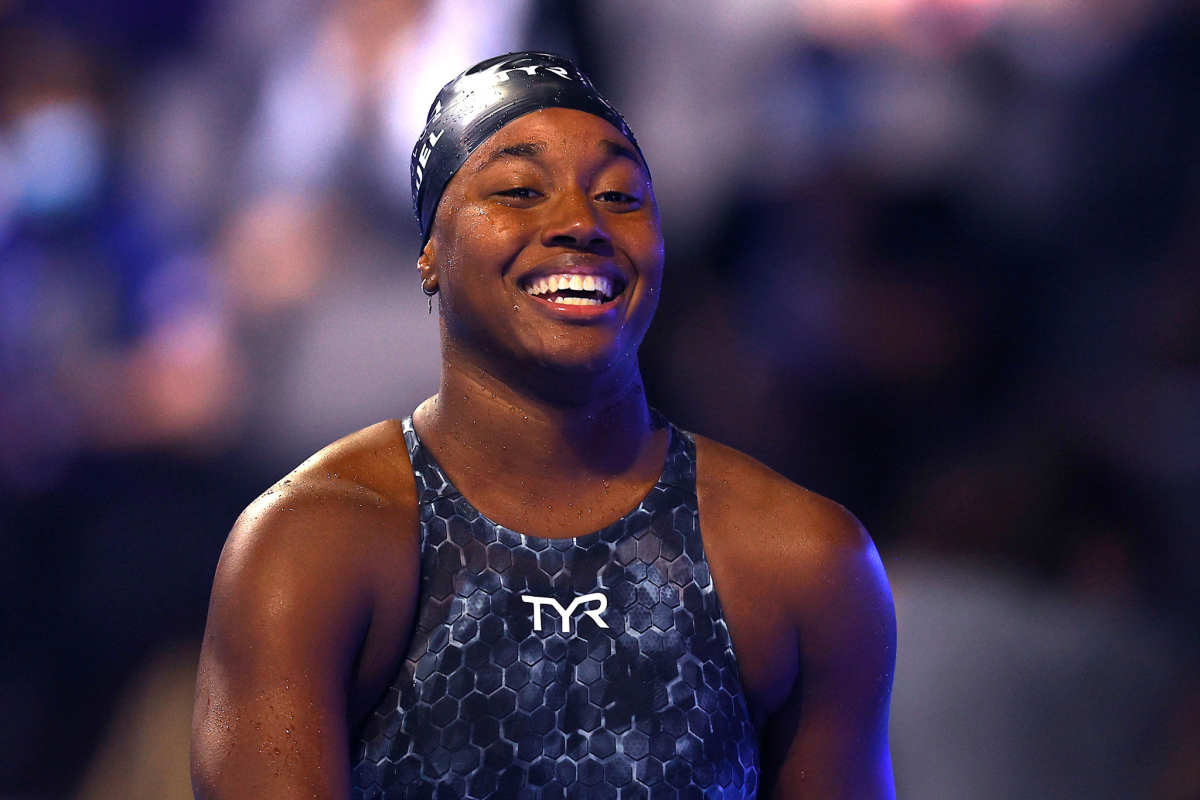Column: Yes, the Olympics are political, including ridiculous rules on swim caps

The 1908 Summer Olympics in London were fascinating for a variety of nonsports reasons, starting with the fact the Games weren’t supposed to be in London in the first place.
But the 1906 eruption of Mt. Vesuvius forced the move away from Rome. The United States finished second in total medals, but the bigger story may have been the flag protest led by Irish American athletes rumored to be angry that Britain would not allow Ireland to field its own team.
I mean, whatever happened to sticking to sports?
The 1908 Olympics is also where FINA — the Games’ aquatic governing body — was founded. On July 19 it will celebrate its 113th birthday. In June, it named Husain Al Musallam as president. And in one of his first acts as president, he dumped a big old pile of … garbage, on Black women.
In 2016, Simone Manuel made history by becoming the first Black woman to win an individual Olympic gold medal in swimming. She finished those Games with two gold and two silver medals. It was a remarkable chapter in the history of a sport that includes racial segregation, which prevented Black Americans from being able to use swimming pools.
So how does FINA respond to this breakthrough? By banning swim caps designed for swimmers with thick, curly and voluminous hair, in time for the upcoming Olympics.
According to Soul Cap, the British company that manufactures the caps, it was told its product was not approved because it was not “following the natural form of the head.” After a tremendous backlash, FINA announced it was reviewing the new policy and that it “is committed to ensuring that all aquatics athletes have access to appropriate swimwear for competition where this swimwear does not confer a competitive advantage” — because nothing says competitive advantage like a swim cap that actually fits a swimmer’s head.
I actually bought a similar cap in London years ago at a natural hair salon. At the time I was swimming a lot for exercise and that cap was a godsend. Because natural Black hair is naturally drier than other types, the chemicals in pools can cause damage.
When you naturally have thick, curly and voluminous hair, finding things like swim caps, baseball caps and helmets can be a chore. That’s because almost all the headgear you find in sporting goods stores are not designed for natural Black hair. These are things a century-old organization that claims to understand “the importance of inclusivity and representation” would know if it truly understood the importance of inclusivity and representation. If Al Musallam is serious about inclusion, he has no sense for showing it.
From the on-court harassment of Venus Williams in the 1999 Australian Open to Brittany Noble, a journalist, losing her job for, among other things, daring to show up to work with the hair she was born with, Black women are targeted for wearing Afrocentric hairstyles so often that legislation called the Crown Act had to be created.
In fact, this week leaders in Raleigh, N.C., are voting on an ordinance to ban discrimination based on hair as part of the national push for the Crown Act.
Now if you find yourself thinking “they should just cut their hair” or “they can just get a perm,” ask yourself whose worldview would deem straight hair or hair with loose curls the gold standard and all other forms of hair unacceptable? Could it be an extension of the worldview that didn’t want Black people in swimming pools to begin with?
The fact that FINA felt the need to introduce what is essentially a hair policy only after a Black woman won a gold medal is exactly why Manuel has said that she still feels like an outsider in her sport despite her tremendous success.
It’s not as if differences in hair texture is a new phenomenon. FINA’s pathetic statement also said Soul Cap was not banned from recreational purposes, which suggests it might have thought about that ban, too.
It’s been quite the July so far, hasn’t it? While segments of the country are still recovering from Vanessa Williams singing the Black national anthem during PBS’ Fourth of July celebration and learning that there is a Black national anthem, other segments are trying to figure out exactly what does “following the natural form of the head” even mean.
One more interesting fact about the 1908 Games: John Baxter Taylor became the first African American to win an Olympic gold medal, as part of the U.S. team’s 400-meter relay squad.
He had participated in the 400-meter individual race, but when his teammate John Carpenter was accused of interfering with Englishman Wyndham Halswelle, the race was nullified. It was to be rerun the next day, but Taylor — who was in third place when the initial race was stopped — joined his teammates in protest and refused to participate.
Another protest … I swear, why can’t we just stick to sports?
More to Read
A cure for the common opinion
Get thought-provoking perspectives with our weekly newsletter.
You may occasionally receive promotional content from the Los Angeles Times.











